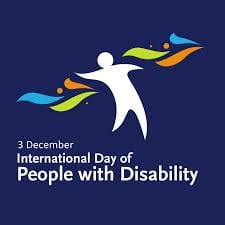By: Liz Wilson
“International Day of Persons with Disabilities (December 3) is an international observance promoted by the United Nations since 1992. It has been celebrated with varying degrees of success around the planet. The observance of the Day aims to promote an understanding of disability issues and mobilize support for the dignity, rights and well-being of persons with disabilities. It also seeks to increase awareness of gains to be derived from the integration of persons with disabilities in every aspect of political, social, economic and cultural life. It was originally called ‘International Day of Disabled Persons’ until 2007. Each year the day focuses on a different issue.” Wikipedia.
“It aims to promote the rights and well-being of persons with disabilities in all spheres of society and development, and to increase awareness of the situation of persons with disabilities in every aspect of political, social, economic and cultural life…2018 Theme: Empowering persons with disabilities and ensuring inclusiveness and equality.” http://www.un.org/en/events/disabilitiesday/
What empowerment is:
Being told you can do something: instilling self efficacy.
Making wise decisions based on your reasons, rather than someone else’s necessarily.
Feeling vested.
“speaking, even when your voice shakes.” – A Lorde.
Building on small successes; seeing results.
What empowerment is not:
Using someone for our agenda or to further goals that do not effect and or benefit that person.
As people living with bipolar disorder we owe it to those that come behind us to empower them and and then nurture and Empower ourselves. The more of us there are that are out spoken about our recovery, the more people can benefit from it.
How do we “ensure inclusiveness and equality”? First and foremost we must accept the other types of disabilities that exist and the people who live and survive these disabilities. We can celebrate the victories of one another knowing that when one of us wins we all win. We can stand up and speak out for people who are unable for whatever reasons to speak out for themselves. We can make sure people with disabilities are represented on boards and decision-making committees for churches and Community groups. What other ways can you think of that we can promote the ideals set forth by the United Nations?
The content of the International Bipolar Foundation blogs is for informational purposes only. The content is not intended to be a substitute for professional medical advice, diagnosis, or treatment. Always seek the advice of your physician and never disregard professional medical advice because of something you have read in any IBPF content.


